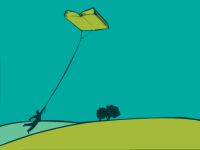5-Minute Film Festival: 10 Stories About Life-Changing Books
Logan Smalley, the director of TED-Ed, asked complete strangers to call him and tell him about a book they loved. In this Five-Minute Film Festival, he shares some of the most moving stories he heard on the importance of reading.
Your content has been saved!
Go to My Saved Content.Six months ago, I did something a little strange. I shared my phone number on the internet and invited complete strangers to leave me anonymous voicemails about the books they love. I transcribed those stories and began sharing them on YouTube as part of the Call Me Ishmael project. I've since received more messages than I can count, and the stories within those messages have confirmed (at least in my mind) what many great librarians, teachers, parents, and readers have always known: A great book is the most powerful change agent in the world.
I've created a playlist of some of the most powerful voicemails I've received to date, plus a few videos that speak to the science and history of reading. As you listen to these stories, I hope you'll be reminded of the books that have affected your own life, and inspired you to pick up your next great read.
Video Playlist: 10 Stories About Life-Changing Books
Watch the first video below, or watch the whole playlist on YouTube.
- The Diary of a Young Girl by Anne Frank (1:56)
Anne Frank's beloved diary inspires a student to begin keeping a journal of her own.
- The Harry Potter Series (2:00)
The Harry Potter series serves as a shield for a young man who grows up with an abusive mother.
- The Sneetches by Dr. Seuss (4:09)
A gentleman born around the time of Brown v. Board of Education explains how a children's book helped him understand the importance of racial equality.
- Extremely Loud and Incredibly Close by Jonathan Safran Foer (3:35)
This caller discusses how she found her sense of self-confidence between the pages of a book.
- The Most Beautiful Libraries in the World (3:33)
Take a moment to silently peruse the world's most beautiful libraries. The only regrettable thing about the images in this video is that they aren't "scratch-n-sniff."
- The Catcher in the Rye by J.D. Salinger (3:15)
A lifelong love affair with Salinger's classic shows how a book gains meaning over time.
- The Atlas of Human Anatomy for the Artist (1:55)
An art teacher's thoughtful gift changes the trajectory of her student's life.
- The Hitchhiker's Guide to the Galaxy (2:35)
Douglas Adam's sense of humor helps a young student cope with a tragic loss.
- How Fiction Makes Our Brains Better (3:07)
Merriam-Webster declared "science" the 2013 word of the year. But can reading something other than data and facts, say a work of fiction, help improve brain function? Anthony of Dnews explains the many possible benefits that reading a fictitious book can have on the brain.
- The Merriam Webster Dictionary (2:28)
Speaking of Merriam-Webster, in this voicemail, a seasoned poet reflects on young love and his first encounter with the dictionary.
- Cutting for Stone by Abraham Verghese (2:31)
Two readers randomly sit next to each other on a plane. A perfect example of empathy ensues.
- The Fault in Our Stars by John Green (1:44)
A reader sees herself in the main character of one of the year's most acclaimed books... and she likes what she sees!
- How and Why We Read (7:00)
To conclude this playlist, listen to John Green offer up his thoughts on reading, and on the crucial role that books have played in the story of humankind, in this CrashCourse video.
More Resources for Exploring Great Books for Students
The following links will help you encourage your students to read, and find even more great books for young readers.
- Find any of these books at your local library using Worldcat
- "Projects to Engage Middle School Readers" from Edutopia
- "The 100 Greatest Books for Kids" from Scholastic
- Learn about the main challenges to literacy according to the organization Reading is Fundamental
- "How to Read a Racist Book to Your Kids" from the New York Times
- "Ten Ways to Cultivate a Love of Reading in Students" from Edutopia.
Do you have suggestions for your own student readers? Have you read any of these books and want to share your thoughts? Comment below!
